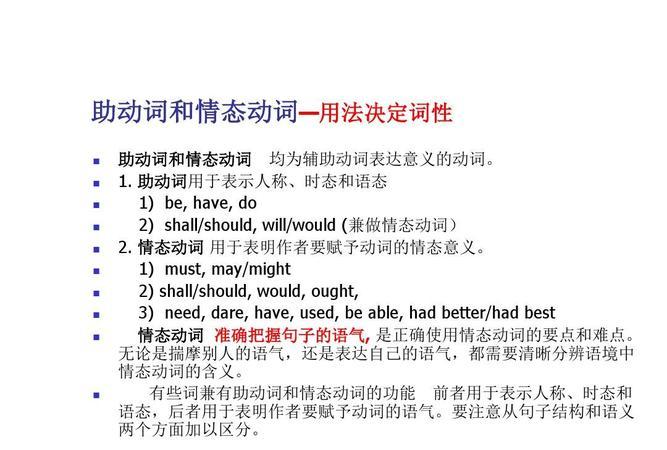英语中的情态助动词包括"can"(表示能力或可能性),"could"(表示过去的能力或可能性),"may"(表示可能性或请求许可),"might"(表示可能性,但语气更委婉),和"must"(表示必要性或推测的强度)。这些情态助动词可以帮助我们更准确地表达情态或推测。

Can
Can 表示能力或者可能性。例如:
- I can speak English fluently. (我能够流利地说英语。)
- She can't come to the party tonight. (她今晚不能来参加派对。)
- Can you give me a ride to the airport? (你能送我去机场吗?)
Could
Could 是 can 的过去式,表示过去的能力或者可能性。例如:
- When I was young, I could run faster than anyone else. (当我年轻的时候,我能跑得比任何人都快。)
- She could have won the competition if she had practiced more. (如果她练习得更多,她本可以赢得比赛。)
- Could you please pass me the salt? (你能把盐递给我吗?)
May
May 表示可能性或者请求允许。例如:
- It may rain later, so bring an umbrella. (天气可能会下雨,所以带把伞。)
- May I ask you a question? (我可以问你一个问题吗?)
- She may not be able to come to the meeting tomorrow. (她明天可能不能来参加会议。)
Might
Might 也表示可能性,但是语气更加委婉。例如:
- I might go to the concert tonight, but I haven't decided yet. (我可能会去今晚的音乐会,但我还没有决定。)
- He might have forgotten his phone at home. (他可能把手机忘在家里了。)
- We might not be able to finish the project on time. (我们可能无法按时完成项目。)
Must
Must 表示必要性或者推测的强度。例如:
- I must finish this report by tomorrow. (我必须在明天之前完成这份报告。)
- You must be tired after working all day. (你一整天工作肯定很累了。)
- He must have left already, because his car is gone. (他一定已经走了,因为他的车不见了。)

